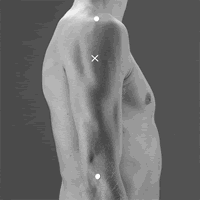|
Muscle
|
||
|
Name
|
Deltoideus
|
|
|
Subdivision
|
Medius
|
|
|
Muscle Anatomy
|
||
|
Origin
|
Lateral margin and superior surface of the acromion.
|
|
|
Insertion
|
Deltoid tuberosity of humerus.
|
|
|
Function
|
The deltoideus medius performs abduction of shoulder
joint, with stabilisation by the anterior and posterior fibres.
|
|
|
Recommended sensor placement procedure
|
||
|
Starting posture
|
Sitting with the position of the trunk in relation
to the arm such that a stable trunk will need no further stabilization.
If the scapula fixation muscles are weak the scapula must be stabilized.
|
|
|
Electrode size
|
Maximum size in the direction of the muscle fibers:
10 mm.
|
|
|
Electrode distance
|
20 mm
|
|
|
Electrode placement
|
||
|
- location
|
Electrodes need to be placed from the acromion to
the lateral epicondyle of the elbow. This should correspond to the
greatest bulge of the muscle.
|
|
|
- orientation
|
In the direction of the line between the acromion
and the hand.
|
|
|
- fixation on the skin
|
(Double sided) tape / rings.
|
|
|
- reference electrode
|
On the proc. spin. of C7 or on / around the wrist.
|
|
|
Clinical test
|
The arm should be abducted without rotation. When
placing the shoulder in test position, the elbow should be flexed
to indicate the neutral position of rotation but may be extended
after the shoulder position is established in order to use the extended
extremity for a longer lever. Pressure needs to be applied against
the dorsal surface of the distal end of the humerus if the elbow
is flexed or against the forearm if the elbow is extended.
|
|
|
Remarks
|
The SENIAM guidelines include a separate sensor
placement procedure for the deltoideus posterior and the deltoideus
anterior muscle.
|
|
